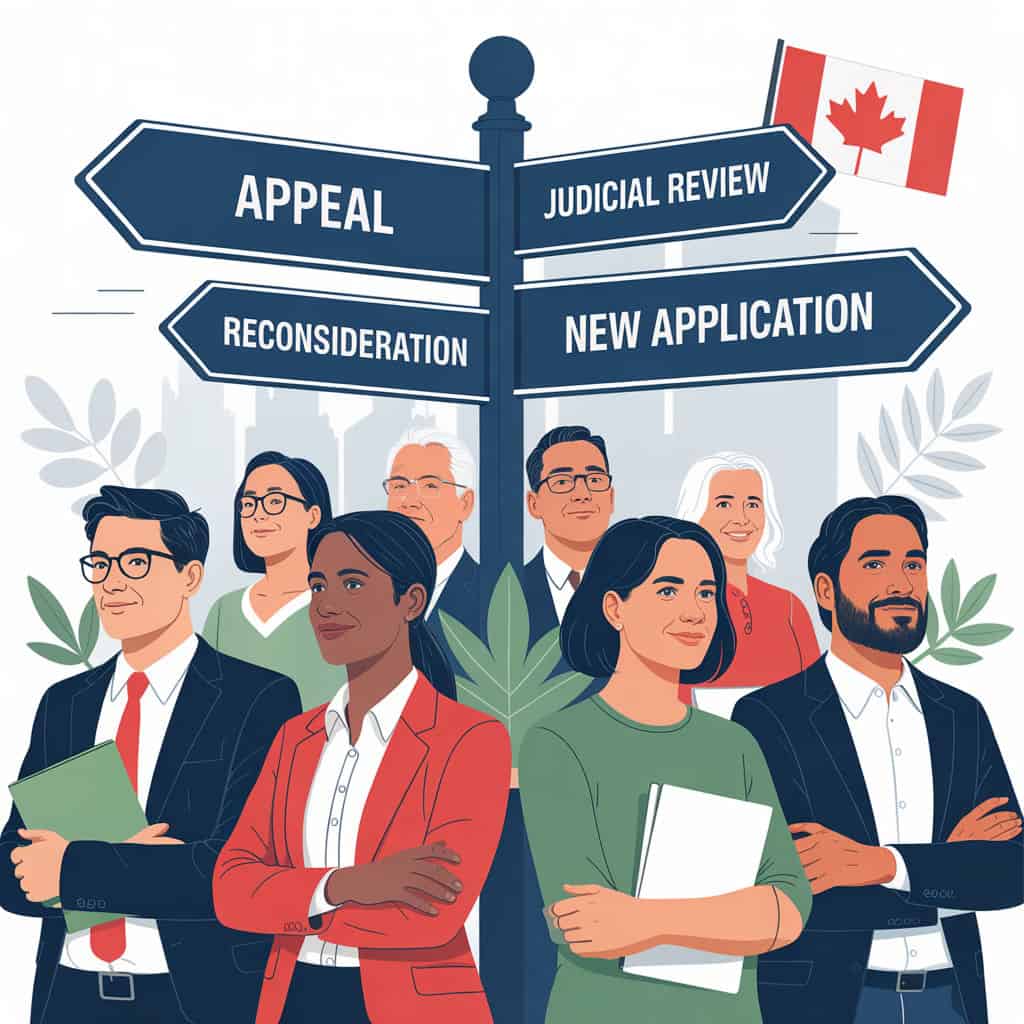
With Canada’s increasingly stringent immigration policies and rising refusal rates, understanding how to respond to a rejected application has become crucial for prospective immigrants. While receiving a refusal letter can be disheartening, it’s important to know that you have options to challenge negative decisions. This comprehensive guide outlines the various pathways available to overturn immigration officer decisions and protect your rights in the Canadian immigration system.
Understanding Your Right to Challenge Immigration Decisions
When faced with a visa refusal, many applicants’ first instinct is to submit a reconsideration request to Immigration, Refugees and Citizenship Canada (IRCC). However, it’s important to understand that IRCC is not obligated to reopen a closed application unless they believe sufficient reasons and evidence justify reopening the case.
Beyond reconsideration requests, applicants have legal avenues to challenge negative decisions. The type of challenge available and corresponding deadlines depend on the specific application or decision being contested. Understanding these options early can make the difference between a successful challenge and missing critical deadlines.
Reconsideration vs. Appeal vs. Judicial Review: Understanding Your Options
Before diving into specific application types, it’s crucial to understand the three main pathways for challenging immigration decisions:
Reconsideration is the most straightforward option, where you ask IRCC to review their decision based on new information or evidence they may have overlooked. However, IRCC has no obligation to reopen your case unless you provide compelling reasons and evidence.
Appeals are available only for certain types of applications and are heard by the Immigration and Refugee Board’s Immigration Appeal Division (IAD). Appeals allow for a fresh review of your case by an independent tribunal and generally have higher success rates than other options.
Judicial Review is a court process where the Federal Court reviews whether IRCC followed proper procedures and applied the law correctly. This option focuses on legal errors rather than reassessing the merits of your application. While potentially powerful, judicial review involves higher costs and more complex procedures.
The key is choosing the right pathway based on your specific situation, application type, and the reasons for refusal.
Common Reasons for Immigration Application Refusals
Understanding why applications get refused helps you better prepare for challenges and prevents future rejections. The most frequent reasons include:
Documentation Issues: Insufficient supporting documents, missing translations, or documents that don’t clearly demonstrate you meet program requirements.
Program Requirements: Failing to meet specific criteria such as language proficiency scores, work experience requirements, or educational credential assessments.
Financial Concerns: Inadequate proof of funds, inability to demonstrate financial support, or concerns about your ability to establish economically in Canada.
Misrepresentation: Providing false information, omitting relevant details, or submitting fraudulent documents, which can result in a five-year ban.
Inadmissibility: Medical conditions that could pose a health risk, criminal history, or security concerns that make you inadmissible to Canada.
Credibility Concerns: Immigration officers doubting your intentions, the genuineness of your relationship (in spousal cases), or your commitment to leaving Canada (for temporary residents).
Understanding these common pitfalls helps you assess whether a refusal decision was justified or if there are grounds for challenge.
Understanding Procedural Fairness Letters: Your Last Chance Before Refusal
One of the most critical but often misunderstood aspects of the immigration process is the procedural fairness letter. Before IRCC refuses an application, they must give you an opportunity to respond to their concerns if you haven’t had an interview.
A procedural fairness letter typically begins with phrases like “I have concerns that you may not meet the requirements…” or “I am not satisfied that…” followed by specific legal provisions. This letter represents your final opportunity to address the officer’s concerns before a refusal decision is made.
You typically have 30 days to respond to a procedural fairness letter, and your response must directly address each concern raised. This is not simply an opportunity to resubmit the same documents – you need to provide new evidence, clarify misunderstandings, or present legal arguments that demonstrate you do meet the requirements.
The quality of your response to a procedural fairness letter often determines whether your application succeeds or fails. Given the technical nature of immigration law and the need for precise legal arguments, seeking professional assistance at this stage is highly recommended. A well-crafted response can save your application, while an inadequate response typically leads to refusal and the need for more expensive and time-consuming challenge processes.
Economic Immigration Application Rejections
Economic immigration encompasses a wide range of programs, including Express Entry streams (Federal Skilled Worker Program, Federal Skilled Trades Program, and Canadian Experience Class), Provincial Nominee Programs, the Atlantic Immigration Program, Quebec-selected skilled workers, and various business immigration streams like the Start-up Visa Program.
Applicants under economic immigration programs do not have the right to appeal to the Immigration and Refugee Board (IRB). Instead, they must pursue judicial review through the Federal Court. The timeline for filing is strict: applications must be submitted within 15 days if the decision was made in Canada, or within 60 days if the decision was made outside Canada.
The lack of appeal rights means that judicial review is often the only option for challenging economic immigration refusals. However, judicial review focuses on whether IRCC followed proper procedures and applied the law correctly, rather than reassessing the merits of your qualifications. Successful judicial review applications typically involve demonstrating that the immigration officer made a legal error, failed to consider relevant evidence, or applied the wrong legal test.
Family-Based Immigration Appeals
Family reunification programs, including spousal sponsorship, parent and grandparent sponsorship, and dependent children sponsorship, offer different appeal rights compared to economic immigration streams. Sponsors in family-based immigration cases have the right to appeal refusal decisions to the Immigration Appeal Division (IAD) within 30 days of the refusal date.
The IAD provides a fresh review of your case and can consider new evidence that wasn’t available during the original application. Appeals often have higher success rates than judicial review because the IAD can reassess both the facts and the law.
However, this right to appeal has limitations. If the sponsored person is found inadmissible due to misrepresentation, criminal records, involvement in organized crime, threats to national security, or violations of international law, sponsors cannot appeal (with exceptions for spouses and children regarding misrepresentation). In cases where no appeal right exists, judicial review becomes the only option to challenge the refusal.
Permanent Resident Status Challenges
Permanent residents facing removal orders or those whose Permanent Resident Travel Document (PRTD) applications have been refused have specific appeal rights. Removal orders can be appealed to the IAD within 30 days, while PRTD refusals can be appealed within 60 days.
These appeals allow permanent residents to present evidence about why they should maintain their status in Canada, including humanitarian and compassionate considerations, the best interests of affected children, and their degree of establishment in Canada.
Interestingly, even PR visa holders who haven’t yet landed in Canada but have received removal orders retain the right to appeal to the IAD. However, similar to family-based immigration, certain inadmissibility findings eliminate appeal rights, including serious criminal convictions (6 months or more), organized crime involvement, national security threats, or human rights violations.
Temporary Resident Application Refusals
Temporary resident applications, including study permits, work permits, and temporary resident visas (including super visas), do not carry appeal rights. The only legal challenge available is judicial review through the Federal Court.
Due to high legal costs associated with judicial review, most applicants choose to reapply when these applications are refused. A new application allows you to address the reasons for refusal and provide additional evidence, often at a lower cost than judicial review.
However, judicial review should be considered in two specific circumstances: when you’re found inadmissible for misrepresentation (resulting in a five-year ban) and believe the officer made an error, or when there are substantial grounds to believe the immigration officer relied on incorrect legal foundations or disregarded submitted evidence. In these cases, the stakes are high enough to justify the additional cost and complexity of court proceedings.
Cost Considerations and Legal Representation
Understanding the financial implications of challenging immigration decisions is crucial for making informed choices. Reconsideration requests involve only the cost of preparing new materials and professional assistance, making them the most affordable option.
Appeals to the IAD typically involve filing fees, legal representation costs, and potential hearing expenses. While more expensive than reconsideration, appeals often provide better value due to higher success rates and the opportunity for a complete review of your case.
Judicial review represents the most expensive option, involving Federal Court filing fees, legal representation, and potential costs awards if unsuccessful. However, when appeal rights don’t exist or when significant legal errors occurred, judicial review may be your only option.
Legal representation becomes essential when dealing with procedural fairness letters, appeals, and judicial review. Immigration law is complex, and the procedural requirements for these processes are strict. Professional assistance significantly improves your chances of success and helps avoid costly procedural errors that could doom your case.
The cost-benefit analysis should consider not only the immediate expenses but also the long-term implications of a failed immigration application, including potential bans, lost opportunities, and the cost of starting over with new applications.
Critical Deadlines and Legal Requirements
Understanding deadlines is crucial for protecting your rights, as missing these timeframes can permanently close your options for challenging a decision:
- Judicial Review (Economic Immigration): 15 days for decisions made in Canada, 60 days for decisions made outside Canada
- Family Immigration Appeals: 30 days to appeal to IAD
- Permanent Resident Removal Orders: 30 days to appeal to IAD
- PRTD Refusals: 60 days to appeal to IAD
- Refugee Claim Denials: 15 days to appeal
- Procedural Fairness Letter Responses: Typically 30 days
These deadlines are strictly enforced, and extensions are rarely granted. The clock starts ticking from the date you receive the decision, making immediate action essential upon receiving any refusal notice or concerning correspondence from IRCC.
Essential Steps for Protecting Your Rights
To maximize your chances of successfully challenging a refusal, follow these critical steps:
First, maintain complete electronic or physical copies of all submitted materials and ensure you understand every document in your application. If you used an agent, request copies of all materials immediately.
Second, research whether your specific application type has appeal rights and the corresponding deadline for filing. Applications without appeal rights require knowledge of judicial review deadlines.
Third, if you receive a procedural fairness letter indicating officer concerns about your application, immediately consult with an immigration lawyer or consultant experienced in immigration litigation to prepare your response.
Finally, upon receiving a refusal letter, immediately assess whether to pursue reconsideration, appeal, or judicial review. This decision should be made with professional guidance, given the complexity of immigration law and strict procedural requirements.
How Canadian Currents Immigration Services Can Help
Immigration refusals require expertise, quick action, and a thorough understanding of complex legal procedures. Canadian Currents Immigration Services brings together a team of experienced immigration lawyers, consultants, and paralegals with decades of combined experience in immigration law practice.
Our professionals understand the nuances of challenging different types of immigration decisions and can quickly assess your situation to determine the best course of action. Whether you need help responding to a procedural fairness letter, preparing an appeal to the Immigration Appeal Division, or filing for judicial review, our team has the litigation experience and legal knowledge necessary to present your case effectively.
We provide comprehensive services including analyzing refusal reasons, developing challenge strategies, preparing legal arguments, gathering additional evidence, and representing clients in hearings and court proceedings. Our experience with procedural fairness responses has helped numerous clients avoid refusals entirely, while our appeal and judicial review expertise has successfully overturned negative decisions.
Don’t let strict deadlines and complex procedures prevent you from exercising your rights. Contact Canadian Currents Immigration Services immediately upon receiving any refusal or concerning correspondence from IRCC. Our experienced team will review your case, explain your options, and work diligently to challenge the decision through the most appropriate legal avenue. Time is critical in immigration matters – let our expertise protect your future in Canada.

We serve ALL of Canada. Currently have offices Western Canada — Vancouver, Calgary, Edmonton, Kamloops and Red Deer. We also have the infrastructure to work with any of our clients virtually — even from the furthest regions of the Yukon to Newfoundland.
Call (778) 331-1164 [toll free 1 (844) 715-0940] to get routed to the best office for you or contact us online to schedule an appointment.
We also have a dedicated intake form to help you get the ball rolling. Our intake team will review your specific case and advise you on the next steps to take as well as what to expect moving forward.
Our offices are generally open 8:30 a.m.—4:30 p.m., Mon—Fri.


Jenny Zheng
IMMIGRATION CONSULTANT
Jenny is a highly experienced senior licensed immigration consultant providing Canadian immigration law services to clients from across the world. Many of Jenny’s clients seek out Jenny’s representation to rely on her deep knowledge and experience in securing successful immigration applications or to challenge unfavourable decisions made by the IRCC.
Jenny welcomes Walk-Ins (without appointment) at our Vancouver office.


